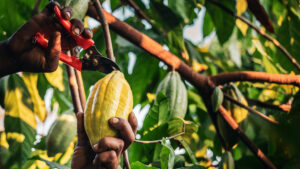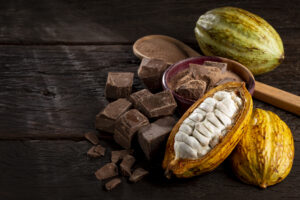By Michael E Odijie, UCL
A shortage of cocoa beans has led to a near shutdown of processing plants in Côte d’Ivoire and Ghana, the two countries responsible for 60% of global production. With chocolate makers around the world reliant on west Africa for cocoa, there is significant concern about the impact on the prices of chocolate and the livelihood of farmers. Cocoa researcher Michael Odijie explains the reasons for the shortage.
Why has cocoa production declined sharply in west Africa?
Three factors are at play: environmental, economic cycle related and human.
One environmental factor is the impact of the El Niño weather phenomenon, which has caused drier weather in west Africa. It has contributed to problems on farms, such as the swollen shoot virus disease. As a result, Ghana has lost harvests from nearly 500,000 hectares of land in recent years.
The economic cycle of cocoa production refers to the inherent patterns of expansion and contraction in cocoa farming. For example, as cocoa trees age, they become susceptible to diseases, requiring high maintenance costs. Historically, farmers have tended to abandon old farms and start anew in fresh forests. Unfortunately, finding new forests is now increasingly difficult. Perhaps the most severe issue of all is the lack of fair compensation for sustainable cocoa production
The human factor includes challenges such as illegal mining, which has overtaken numerous farms in Ghana. Sometimes, farmers lease their land to illegal miners in exchange for payment. These mining activities degrade the quality of the land, making it unsuitable for cocoa cultivation.
The global market for chocolate and chocolate products is on the rise. It is projected to grow faster than 4% annually over the next few years. This growing demand for cocoa underscores the urgency in addressing the intertwined issues that relate to the industry’s sustainability.
Have west African governments intervened to help cocoa farmers?
In February 2024, the Ghana Cocoa Board (Cocobod), regulator of the country’s cocoa sector, secured a World Bank loan of US$200 million to rehabilitate plantations affected by the cocoa swollen shoot virus. The board will take over the disease-ridden farms, remove and replace the afflicted cocoa trees, and nurture the new plantings to the fruiting stage before returning them to the farmers.

This practice of Cocobod taking out loans to assist farmers is a longstanding one in Ghana. For instance, in 2018, Cocobod used part of a $600 million loan from the African Development Bank to rehabilitate aging plantations and those hit by diseases. And at the start of the current harvest season in October, the producer price was raised: farmers are paid more, a move made inevitable by the surge in global prices. Also, Ghana Cocobod has established a task force to shield cocoa farms from the harmful impacts of mining. It has cooperated with police to stem the smuggling of cocoa to neighboring countries, particularly those that offer a stronger currency.
In Côte d’Ivoire, relatively little action has been taken. It appears the government is still assessing the situation. But there have been measures to curb smuggling of cocoa, prompted by the fact that the shortage is driving up prices in neighboring countries. Côte d’Ivoire does benefit from numerous sustainability programs initiated by multinational corporations. The current shortage has accelerated these initiatives. Regrettably, some of the programs do not disclose their data, making it difficult for academics to access and analyze their information.
African governments have yet to address significant structural issues in their interventions.
How have cocoa farmers and cocoa-producing countries’ economies been affected?
At the farm level, although the rise in prices may initially appear beneficial to farmers, the reality is not straightforward. A decrease in output leads to fewer harvests on average, which means that, overall, farmers are not earning more. This issue is compounded by recent economic challenges in west Africa, such as high inflation and currency devaluation, particularly in Ghana. These factors have resulted in farmers becoming poorer.
Another impact of the output decline is a reduction in local processing. Major African processing facilities in Côte d’Ivoire and Ghana have either ceased operations or reduced their processing capacity because they cannot afford to purchase beans. This likely means that chocolate prices worldwide will surge. This, in turn, adversely affects the local production units that have been emerging in recent years.
However, the bargaining power of west African cocoa-producing countries seems to have increased. Now is an opportune moment for these nations to unite and negotiate more favorable terms for their cocoa farmers.
Will chocolate makers eventually turn to cocoa alternatives?

It’s inevitable because continuing to cultivate cocoa under current conditions is unsustainable. I don’t perceive this negatively; I hope it occurs sooner rather than later. In fact, it is already underway with the rise of cocoa butter equivalents, cocoa extenders and artificial flavors (synthetic or nature-identical flavors that mimic the taste of chocolate without the need for cocoa).
The German company Planet A Foods is a leader in this area. It produces cocoa-free chocolate, using technology to transform ingredients such as oats and sunflower seeds into substitutes for cocoa mass and butter.
Overall, this is beneficial for everyone. The demand for cocoa has resulted in mass deforestation and significant carbon emissions, issues that are likely to worsen due to climate change. Moreover, the push for cultivation has led to various forms of labor abuses. Exploring cocoa alternatives is certainly part of the solution.![]()
Michael E Odijie is a research associate at UCL.
This article is republished from The Conversation under a Creative Commons license. Read the original article.



